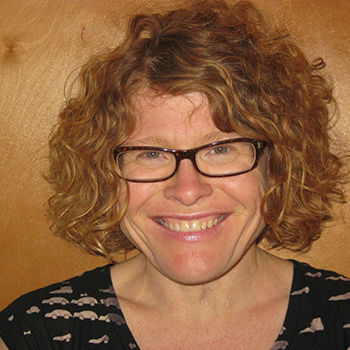Visiting professor draws connections between ableism, speciesism through art

Author of “Feminist, Queer, Crip” Alison Kafer presented “Seeing Animals, Seeing Crips,” as part of the Center for Ethics and Leadership Speaker Series.
Author of “Feminist, Queer, Crip” Alison Kafer presented to a full house Monday. Her talk, “Seeing Animals, Seeing Crips,” was the first installment of the Center for Ethics and Leadership Speaker Series this semester.
The professor of feminist studies at Southwestern University projected images from painter and friend Sunaura Taylor. During the 40-minute talk, Kafer combined Taylor’s mixed-media images and her background in feminist, queer and critical race theory to investigate the relationship between animal and disability studies.
“If you want to think about paintings as having an argument, I think Sunaura’s main argument would be that ableism and speciesism are related and that disability movements and animal movements need to work together. That’s her work,” Kafer said. “So my work is questioning, ‘What does it mean to look for solidarity across movements?’ ‘What are the ethical dimensions of that?’”
Like many students in attendance, Junior Spencer Evans first heard about the Speaker Series in an email from one of her professors. But Evans didn’t know what to expect.
“Seeing how many people showed up to [Kafer’s talk] kind of helped me realize that I’m not the only one with a disability,” Evans said. “It was interesting to hear [Kafer] discuss how it would be interesting to hear an abled person’s view of these images as compared to disabled… Everyone is going to look at [Taylor’s art] differently, and even globally it will look completely different, especially for the animal rights portion of the images.”
Director of the Center for Ethics and Leadership and Associate Professor of Philosophy Jack Musselman arranged Kafer’s visit and was in attendance during her presentation.
“The work Dr. Kafer does in different fields takes place at new and interesting intersections of different academic disciplines,” Musselman said. “And since we’re a Catholic university, if the people she studies are traditionally or historically excluded then we have additional educational reasons to give them a seat at the table.”
Although Kafer lives in Austin, Monday was her first time visiting St. Edward’s campus. She said that everybody seemed so friendly and welcoming and that the questions she received during the Q&A portion of her presentation were “fabulous” and “super-smart.”
“Everybody has relationships with people who move and think differently, and we all are operating in this culture that valorizes very particular bodies and very particular minds,” Kafer said. “So regardless of whether or not people ‘have a disability,’ they are still impacted by ableism.”






